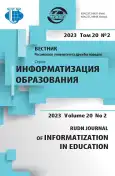Didactics and pedagogical anthropology of digital educational environments
- Autores: Agatova O.A.1
-
Afiliações:
- Russian Academy of Education
- Edição: Volume 20, Nº 2 (2023)
- Páginas: 176-197
- Seção: DIGITAL EDUCATIONAL ENVIRONMENT
- URL: https://journal-vniispk.ru/2312-8631/article/view/321280
- DOI: https://doi.org/10.22363/2312-8631-2023-20-2-176-197
- EDN: https://elibrary.ru/JZTIIK
- ID: 321280
Citar
Texto integral
Resumo
Problem statement. In the context of the scientific and technological development of the country, the implementation of the federal experiment on the development of digital educational environments, the introduction of new legal regimes for digital transformations of industries, including education, the issues of fundamental and applied developments in pedagogical anthropology and didactics of digital educational environments are being updated. The development of expert tools for assessing the developing functionality of digital educational environments is becoming relevant. The aim of the study is to analyze digital means of pedagogical activity, to systematize changes in didactic principles. Methodology. Analysis of the development of didactics, pedagogical anthropology in the context of the use of digital didactic tools is based on the study of digital educational environments created during the federal experiment. The study of digital didactic tools used by teachers was organized during the annual interregional webinar of the Russian Academy of Education. According to the research methodology, the requirements for the preparation of reports by webinar participants were based on the structured interview method. Results. The frontiers of changes in didactics and pedagogical anthropology in the conditions of digital educational environments are characterized. Essential changes in the practice of pedagogical activity, ways of organizing the educational process, ways of constructing the interaction of participants in educational relations are revealed. The results presented in the publication are significant for the development of the methodology of modern didactics and pedagogical anthropology and the theory and practice of expertise in education in terms of assessing the developmental functionality of digital educational environments. Conclusion. To evaluate the results of the federal experiment on the introduction of digital educational environments, a proven methodology for the examination of the developing functionality of digital educational environments is needed.
Sobre autores
Olga Agatova
Russian Academy of Education
Autor responsável pela correspondência
Email: olga_agatova@mail.ru
ORCID ID: 0000-0003-3004-8067
Doctor of Pedagogical Sciences, Associate Professor, Head of the Laboratory for the Development of the Digital Educational Environment
8 Pogodinskaya St, Moscow, 119121, Russian FederationBibliografia
- Arkhangelsky AN, Dubrovsky VN, Lebedeva MYu, Miklyaeva AV, Muranov AA, Fiofanova OA. Personality enhanced by digital means. Bulletin of the Russian Foundation for Basic Research. 2022;(1):38‒52. (In Russ.) http://doi.org/10.22204/2410-4639-2022-113-01-38-51
- Vygotsky LS. Pedagogical psychology. Moscow: AST Publ.; 2010. (In Russ.)
- Davydov VV. The theory of developmental learning. Moscow: INTOR Publ.; 1996. (In Russ.)
- Shchedrovitsky PG. Introduction to philosophical and pedagogical anthropology. Moscow: Politicheskaya Entsiklopediya; 2018. (In Russ.)
- Ushinsky KD. Pedagogical anthropology (vol. 1). Moscow: Yurayt Publ.; 2017. (In Russ.)
- Agatova OA. Big data in education: data-anthropo for development policies and practices. Moscow: Nauka Publ.; 2022. (In Russ.)
- Fiofanova OA. Digital educational environment standards and data architecture in education. Vestnik MGPU. Series: Informatics and Informatization of Education. 2022;(1):37‒46. (In Russ.) http://doi.org/10.25688/2072-9014.2022.59.1.04
- Semenov AL. Effective education of the extended personality in a transparent world on a digital educational platform. Herzen Readings: Psychological Research in Education (issue 3). St. Petersburg: Herzen State Pedagogical University; 2020. p. 590‒596. (In Russ.) http://doi.org/10.33910/herzenpsyconf-2020-3-27
- Osmolovskaya IM. Theoretical and methodological problems of the development of didactics. Pedagogy. 2013;(5):35‒44. (In Russ.)
- Perminova LM. Didactics in the context of modern scientific knowledge. Pedagogy. 2013;(5):57‒63. (In Russ.)
- Perminova LM. Modern didactics: from Comenius to the present day: philosophical and pedagogical aspects. 3rd ed., enlarged, revised. Moscow: Shkolnye Tekhnologii Publ.; 2021. (In Russ.)
- Surchalova LV. Interdisciplinary tasks as a means of improving the quality of education of lyceum students (on the example of studying computer science and synergetics) (abstract of the dissertation of Candidate of Pedagogical Sciences). Saratov; 2001. (In Russ.)
- Soldatova GU, Rasskazova EI, Nestik TA. Digital generation of Russia: competence and safety. Moscow: Smysl Publ.; 2020. (In Russ.)
- Kondakov AM, Sergeev IS. Methodological foundations of network design educational environment of general education as a convergent space development of the personality of the student: materials of the meeting of the Bureau of the Philosophy of Education and Theoretical Pedagogy Department. 26 January 2021. Moscow: Russian Academy of Education; 2021. (In Russ.)
Arquivos suplementares









